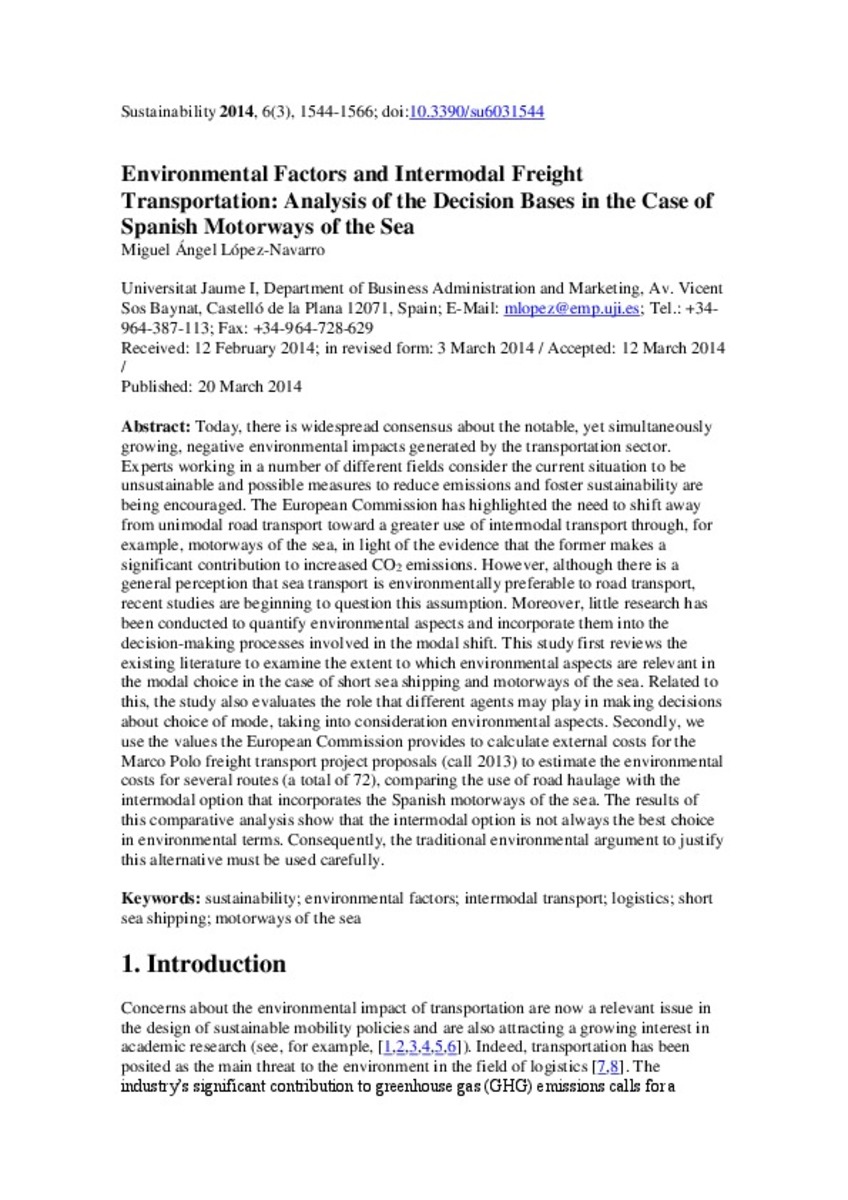Mostrar el registro sencillo del ítem
Environmental Factors and Intermodal Freight Transportation: Analysis of the Decision Bases in the Case of Spanish Motorways of the Sea
| dc.contributor.author | López-Navarro, Miguel Ángel | |
| dc.date.accessioned | 2015-06-17T11:32:12Z | |
| dc.date.available | 2015-06-17T11:32:12Z | |
| dc.date.issued | 2014-03 | |
| dc.identifier.citation | LÓPEZ-NAVARRO, Miguel Ángel. Environmental Factors and Intermodal Freight Transportation: Analysis of the Decision Bases in the Case of Spanish Motorways of the Sea. Sustainability, 2014, 6.3: 1544-1566. | ca_CA |
| dc.identifier.uri | http://hdl.handle.net/10234/123808 | |
| dc.description.abstract | Today, there is widespread consensus about the notable, yet simultaneously growing, negative environmental impacts generated by the transportation sector. Experts working in a number of different fields consider the current situation to be unsustainable and possible measures to reduce emissions and foster sustainability are being encouraged. The European Commission has highlighted the need to shift away from unimodal road transport toward a greater use of intermodal transport through, for example, motorways of the sea, in light of the evidence that the former makes a significant contribution to increased CO2 emissions. However, although there is a general perception that sea transport is environmentally preferable to road transport, recent studies are beginning to question this assumption. Moreover, little research has been conducted to quantify environmental aspects and incorporate them into the decision-making processes involved in the modal shift. This study first reviews the existing literature to examine the extent to which environmental aspects are relevant in the modal choice in the case of short sea shipping and motorways of the sea. Related to this, the study also evaluates the role that different agents may play in making decisions about choice of mode, taking into consideration environmental aspects. Secondly, we use the values the European Commission provides to calculate external costs for the Marco Polo freight transport project proposals (call 2013) to estimate the environmental costs for several routes (a total of 72), comparing the use of road haulage with the intermodal option that incorporates the Spanish motorways of the sea. The results of this comparative analysis show that the intermodal option is not always the best choice in environmental terms. Consequently, the traditional environmental argument to justify this alternative must be used carefully. | ca_CA |
| dc.format.extent | 22 p. | ca_CA |
| dc.format.mimetype | application/pdf | ca_CA |
| dc.language.iso | eng | ca_CA |
| dc.publisher | MDPI | ca_CA |
| dc.relation.isPartOf | Sustainability 2014, 6(3) | ca_CA |
| dc.rights | © 2014 by the authors | ca_CA |
| dc.rights | Attribution 4.0 Spain | * |
| dc.rights.uri | http://creativecommons.org/licenses/by-sa/4.0/ | * |
| dc.subject | sustainability | ca_CA |
| dc.subject | environmental factors | ca_CA |
| dc.subject | intermodal transport | ca_CA |
| dc.subject | logistics | ca_CA |
| dc.subject | short sea shipping | ca_CA |
| dc.subject | motorways of the sea | ca_CA |
| dc.title | Environmental Factors and Intermodal Freight Transportation: Analysis of the Decision Bases in the Case of Spanish Motorways of the Sea | ca_CA |
| dc.type | info:eu-repo/semantics/article | ca_CA |
| dc.identifier.doi | http://dx.doi.org/10.3390/su6031544 | |
| dc.rights.accessRights | info:eu-repo/semantics/openAccess | ca_CA |
| dc.relation.publisherVersion | http://www.mdpi.com/2071-1050/6/3/1544/htm | ca_CA |
Ficheros en el ítem
Este ítem aparece en la(s) siguiente(s) colección(ones)
-
EMP_Articles [453]








